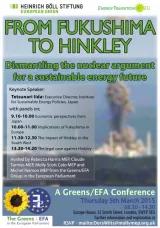Fukushima: Four Years Later
On 11 March 2011, one of the most powerful earthquakes on record hit the north-east of Japan. The resulting tsunami struck the nuclear power plant Fukushima Daiichi and heavily damaged the plant. Massive amounts of radioactive material were released into the environment. Since Chernobyl in 1986 this has been the largest nuclear disaster with far-reaching consequences.
Four years after the disaster it's time to take stock: with Tetsunari Iida, executive director of the Institute for Sustainable Energy Policies in Japan. He exposed to the audience a first-hand insight into the current situation in Fukushima and on how the disaster impacted life in Japan: as a society and in terms of its economic and energy policy - especially, in the light of the recent controversial debate on returning to nuclear power.
The Fukushima disaster and its impacts still today are also of significance from an EU perspective, as Jan Vande Putte, energy expert at Greenpeace Belgium/Japan, elaborated. The current discussions on an internal energy market and proposals for an Energy Union as well as the growing chorus of support for nuclear as an allegedly "climate-friendly" indigenous energy source underlines this fact.
The panelists based their discussion on the following key questions:
- How is the current situation in Japan? Is there progress with regard to the decontamination work and a possible return of citizens to their hometowns?
- Is it realistic that the Japanese government will restart its nuclear power plants? What would be the reasons to do so and in which time?
- What is the Japanese public opinion about nuclear energy?
- Are there societal and/or political movements against nuclear energy?
